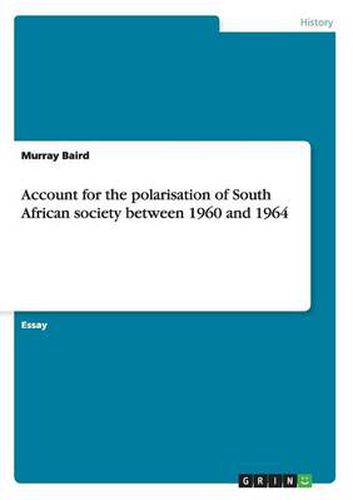Readings Newsletter
Become a Readings Member to make your shopping experience even easier.
Sign in or sign up for free!
You’re not far away from qualifying for FREE standard shipping within Australia
You’ve qualified for FREE standard shipping within Australia
The cart is loading…






Essay from the year 2007 in the subject History - World History - Modern History, grade: 1c, University of Stirling, course: Apartheid and Resistance in South Africa, 1948 - 1994, language: English, abstract: Apartheid and Resistance in South Africa, 1948 - 1994 Any account of the polarisation of African society into distinct white and black polarities, on the right and left wings of the political spectrum respectively, between 1960 and 1964 must be considered in the light of pre-existing relationships between whites and non-whites in South Africa, which manifested themselves in microcosm with events at Sharpeville on 21 March 1960. Critical to the discussion will be the role played by the National Party government, particularly relating to the creation of the Republic of South Africa in 1961, withdrawal from the Commonwealth of Nations in the same year, the 1961 General Election and the government’s racial policy. The function of the United Party, as the party of Official opposition, will also be scrutinised, together with the role of the Liberal Party and the Progressive Party. Analysis of the ideologies of the African resistance movements, including the African National Congress, with Umkhonto we Sizwe, and the Pan-Africanist Congress, with Poqo, will further reveal reasons for the adoption of extreme opposing attitudes. Moreover, these diametric attitudes were subjected to influence from, and response to, international events both within Africa and globally.
$9.00 standard shipping within Australia
FREE standard shipping within Australia for orders over $100.00
Express & International shipping calculated at checkout
Essay from the year 2007 in the subject History - World History - Modern History, grade: 1c, University of Stirling, course: Apartheid and Resistance in South Africa, 1948 - 1994, language: English, abstract: Apartheid and Resistance in South Africa, 1948 - 1994 Any account of the polarisation of African society into distinct white and black polarities, on the right and left wings of the political spectrum respectively, between 1960 and 1964 must be considered in the light of pre-existing relationships between whites and non-whites in South Africa, which manifested themselves in microcosm with events at Sharpeville on 21 March 1960. Critical to the discussion will be the role played by the National Party government, particularly relating to the creation of the Republic of South Africa in 1961, withdrawal from the Commonwealth of Nations in the same year, the 1961 General Election and the government’s racial policy. The function of the United Party, as the party of Official opposition, will also be scrutinised, together with the role of the Liberal Party and the Progressive Party. Analysis of the ideologies of the African resistance movements, including the African National Congress, with Umkhonto we Sizwe, and the Pan-Africanist Congress, with Poqo, will further reveal reasons for the adoption of extreme opposing attitudes. Moreover, these diametric attitudes were subjected to influence from, and response to, international events both within Africa and globally.